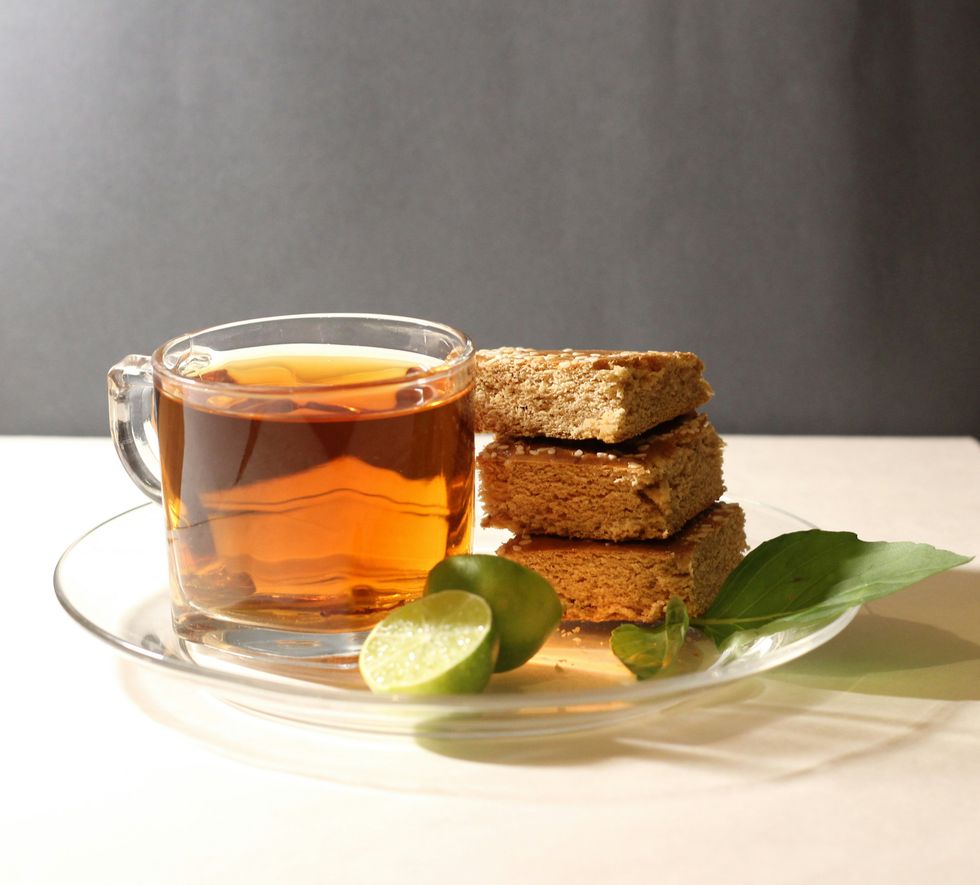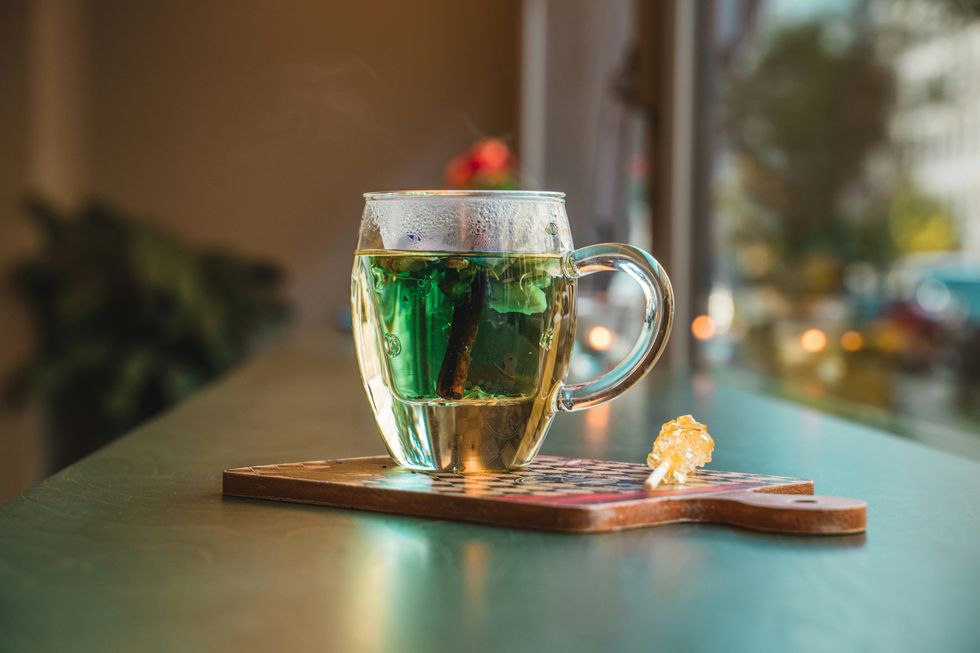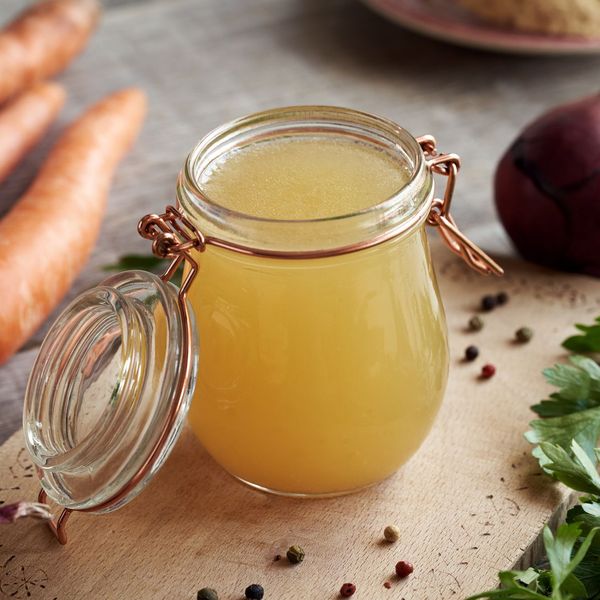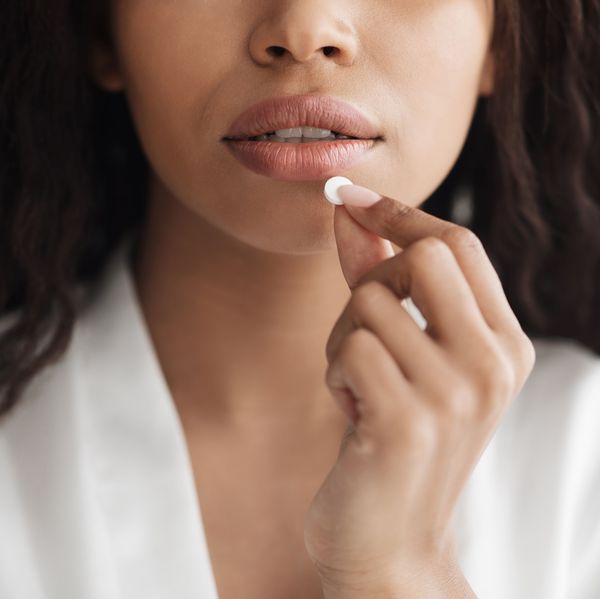
A couple of days ago, I walked into my wax appointment and, although the woman who does my waxes for me is a cutie-pie, she looked good-n-crazy then. Her eyes were red and swollen, her face was puffy, her voice was raspy and she was sneezing nonstop. I live in Music City — Nashville, Tennessee, that is — and so I automatically knew what was going on: it’s March, so she was dealing with allergies. As she explained to me that she had been feeling pretty miserable and knew that she would until she could fill out her prescription, I mentioned a couple of teas that might be able to provide her with a bit of relief.
And that reminded me that I should share a list of them, en masse. Because, even though it is warming up outside, that doesn’t mean that you can’t turn your hot cup of herbal tea into a tall glass of iced herbal tea, right? I mean, especially since cool temperatures actually help to restrict your blood vessels which, in turn, can reduce swelling and inflammation.
Anyway, if like her, your allergies have you feeling some type of way and it ain’t very good, here are 10 teas that might make it easier to adjust to the pollen that, like clockwork, the spring season has to offer.

Unsplash
1. Peppermint Tea
If you enjoy the taste of mint, treat yourself to some peppermint tea over the next couple of weeks. Peppermint tea will bless you on a few different levels because it contains properties that will help to bring relief to gas and bloating; can give you an energy boost; help you to lose weight; help you to sleep more soundly, and peppermint tea can even help to ease menstrual pain discomfort.
The reason why you should try it for your allergies is since peppermint is able to relax your muscles and reduce pain, it may be able to soothe headaches and migraine tension that may be associated with them. Not only that but peppermint also contains antibacterial, antiviral, and anti-inflammatory properties, has menthol in it that can help to clear up your sinuses and, some studies even say that peppermint may assist in suppressing seasonal allergy-related symptoms like itchy eyes and sneezing.
2. Ginger Tea
If your palate prefers tea that is on the spicy side, go with ginger. It’s also a tea that has quite a bit of health benefits including the fact that it eases nausea and morning sickness; can help to reduce the risk of heart disease; helps to regulate blood sugar; contains cancer-fighting properties; reduces oxidative stress, and it can bring relief to menstrual discomfort too.
And just how does ginger tea help on the allergies front? For starters, the compounds gingerol and shogaol help to reduce inflammation within your system. Also, one study revealed that ginger has the ability to decrease certain cytokines (proteins that are secreted by your immune system’s cells that monitor inflammation within your body) so that you don’t have to deal with things like having a runny nose or an itchy throat. Another perk that comes with ginger is it can help you to sneeze less. Interesting.

Unsplash
3. Lemon Balm Tea
What if something citrusy is more your thing? Lemon balm can (pardon the pun, considering the topic) scratch that itch, especially if you also have a taste for a tea that has a hint of sweetness to it. Health-wise, lemon balm tea is good for you because it helps to put you in a better mood; boosts cognitive function; helps to reduce anxiety and depression-related symptoms; improves your quality of rest; soothes indigestion, and contains pretty potent antiviral properties as well.
Another thing worth noting about lemon balm, is certain studies have revealed that by using it topically, it can reduce breakouts that are directly related to herpes (check out “If You Have Herpes, When Should You Reveal It To A Potential Partner?”).
Allergies-wise, lemon balm tea can be good for you because it is loaded with antioxidants and anti-inflammatory properties which tend to work together to decrease symptoms that are associated with having allergies. However, it should go on record that if you happen to have some sort of thyroid issue, you should speak with your doctor before consuming lemon balm. Some studies say that high amounts of lemon balm can throw your thyroid hormones off a bit.
4. Green Tea
If any tea tastes kind of grassy or like a plant, green tea would be it — not really in a nasty way…it’s just kind of bland; however, it’s not anything that a teaspoon (or two) of honey can mask. Besides, the health benefits that come from green tea make it worth every sip because green tea can do everything from boost brain power, burn fat, and improve your oral health to lower your blood sugar levels, decrease the risk of heart disease and cancer and reduce your signs of aging.
The antioxidants in green tea can help to keep your immune system strong, which again, is always a plus as far as battling allergy symptoms are concerned. Green tea also has anti-allergenic agents in it that bring relief to sneezing, coughing and watery eyes.

Unsplash
5. Rooibos Tea
Sweet. Nutty. Woodsy. Earthy. A hint of vanilla. When trying to describe what rooibos tea tastes like, all of these things can certainly apply. Personally, I like rooibos tea because it has no caffeine while being high in antioxidants. Some of its other benefits include the fact that rooibos can help to lower your cancer risk; reduce symptoms that are related to diabetes; it helps to bring down your cholesterol levels; it helps to fade the appearance of wrinkles (over time), and is also good for your heart.
Rooibos can make your allergies easier to bear because it contains a flavonoid called aspalathin which helps to reduce the symptoms that are associated with having allergies including nasal congestion.
6. Nettle Tea
“Sweet and earthy” is how a lot of people describe the taste of nettle tea. If you’ve got a urinary tract infection (UTI), it can help to flush out the bacteria that causes it. If you have arthritic pain, it can help to bring you some much-needed relief. If you’re trying to keep your blood sugar levels under control, nettle tea can help with that as well as keeping your cholesterol levels where they should be; it even contains properties that can help to heal acne and eczema-related symptoms.
Your allergies won’t like nettle tea very much because it also works as a natural antihistamine; this means that it reduces symptoms that are associated with hay fever including sneezing and itchiness.

Unsplash
7. Chamomile Tea
There honestly aren’t too many things that chamomile tea can’t help to improve (check out “8 Teas That Are Really Good For Your Vaginal Health” and “Got A Killer Cold? These 10 Hacks Will Help You To Sleep Better.” and “10 Teas That Are Great For The Fall Season — As Far As Hair Growth Is Concerned”). Taste-wise, it’s mild, floral, and a little bit sweet. Health-wise, it reduces PMS symptoms, regulates blood sugar levels, and helps to keep your skin healthy, thanks to the properties in it that reduce breakouts and increase hydration.
Chamomile is also loaded with anti-inflammatory properties that help to bring relief to allergy symptoms. Chamomile also has anti-allergy properties in it that can block histamines and keep your eyes from watering up and your nose itching (although if you are allergic to daises, it’s best to avoid this tea because it belongs to the Asteraceae family…like daisies do).
8. Licorice Tea
To me, licorice tea is definitely reminiscent of black licorice although some people say that it’s a mixture of sweet and bitter flavors. And since licorice tea is basically made of licorice root, licorice root is good for you because it provides digestive support; can reduce acid reflux; helps to speed up the healing process of peptic ulcers; will fight reduce the bacteria that cause cavities, and it can even help to ease perimenopause/menopause-related symptoms.
The reason why licorice root can help you with your allergies is it contains anti-inflammatory properties that can help your respiratory system in top shape. Also, it helps to soothe a sore throat, prevent a runny nose, reduce sneezing and nasal congestion and licorice can bring relief to itchy and watery eyes.

Getty Images
9. Black Tea
Black tea? Black tea is pretty robust with a smoky flavor and, if you’re looking for a coffee alternative, while it doesn’t have as much caffeine in it as java, it does contain more than green or white tea does. Moving on to how black tea can help out your health, it helps to strengthen your heart; lowers your risk of having a stroke; decreases your cancer risk; makes you more alert; reduces stress, helps your body to burn more fat, and even increases longevity.
Black tea may help to ease allergy-related symptoms because it has the flavonoid quercetin in it. Quercetin is great at fighting allergies because it hinders the release of histamines which helps to keep you from having a runny nose, hives, watery eyes, and face swelling. As a bonus, black tea contains anti-inflammatories and antioxidants too.
10. Yerba Mate Tea
This tea here has a bit of a unique flavor because it’s kinda smoky, kinda earthy, and kinda bitter — but again, if you add some honey to it, it could become a tea that you grow to really like; especially since it is able to do things like increase the quality of your workouts; help you to lose weight; give you more energy; lower your blood pressure and cholesterol levels; improve the quality of your skin; make type 2 diabetes more manageable, and it can increase bone density too (which is important as you age).
Yerba Mate rounds out the list of teas that are wise to consume during allergy season because it reduces inflammation and it helps to fight off free radicals as well.
____
As the weather starts to heat up, it’s always a good idea to stay hydrated. And if you want to do so while being outdoors, now you have some teas that can help you to take in the sun without dealing (so much with) seasonal spring allergy symptoms. Drink up!
Let’s make things inbox official! Sign up for the xoNecole newsletter for love, wellness, career, and exclusive content delivered straight to your inbox.
Featured image by Tempura/Getty Images
This Is How To Keep 'Holiday Season Stress' From Infecting Your Relationship
Hmph. Maybe it’s just me, but it seems like there is something really weird happening in the fall season air (because winter doesn’t officially begin until December 21) that cuddle season is in full swing while break-up season is as well. In fact, did you know that break-ups are so popular during the holiday season that December 11 is deemed Break-Up Day?
The reasons why relationships shift around this time vary; however, I did both roll my eyes and chuckle when I read that a very popular one is because it’s an easy way to get out of getting one’s significant other a Christmas present. SMDH.
Anyway, I personally think that the less shallow folks out here may contemplate calling things “quits” or they at least distance themselves a bit from their partner (and what I’m referring to is serious relationships) due to all of the stress and strain that oftentimes comes with the holidays whether it be financial, familial, due to their tight schedules or something else.
Listen, I would hate for you and your man to miss the fun and happiness of experiencing this time of year, all because you are so overwhelmed or irritated that you can’t really enjoy it. That’s why I have a few practical tips for how to avoid allowing the typical holiday season stress from INFECTING your relationship.
Manage Your Expectations
 Giphy
GiphyUnmanaged expectations. If there is a main reason why the holiday season tends to be so stress-filled for so many people, I’d bet good money that this is the cause. And when you’re in a long-term relationship, expectations can manifest themselves in all sorts of cryptic and/or unexpected ways. You might have relatives who assume that you are going to be with them for Thanksgiving or Christmas when you have other plans in mind. You might be thinking that you are going to spend one amount for presents while your man is thinking something totally different. When it comes to scheduling, your signals may be crossed.
And you know what? To all of these scenarios, this is where clear and consistent communication come in. Don’t assume anything. Don’t dictate anything either. From now until New Year’s, mutually decide to check in once a week, just to make sure that you are both on the same page as it relates to the holidays and what you both are thinking will come along with it. The less blindsided you both feel, the less stressed out you will be. Trust me on this.
Set (and Keep) a Budget
 Giphy
GiphyOkay, so I read that last year, 36 percent of Americans incurred some type of holiday-related debt. Hmph. Last year, there was still some sense of normalcy in this country, chile, so I can only imagine what finances are gonna look like over the next several weeks. That said, since I don’t know a lot of people who don’t find being broke stressful, make sure that you and your bae set a budget and then stick to it this year — no ifs, ands or buts.
Because really, y’all — it doesn’t make sense to deplete savings and/or max out credit cards for a few days of giggles only to be damn near losing your mind because you don’t know how to make ends meet come Dr. Martin Luther King, Jr. Day.
And by the way, this tip doesn’t just speak to things like food and gifts; I also mean travel. If it doesn’t make a ton of sense (or cents) to be all over the place this year — DON’T BE.
Keep Matthew 5:37 at the Forefront
 Giphy
GiphyIf off the top of your head, you don’t know what Matthew 5:37 says, no worries, here ya go: “But let your ‘Yes’ be ‘Yes,’ and your ‘No,’ ‘No.’ For whatever is more than these is from the evil one.” That verse right there? Oh, it’s a boundaries lifesaver! I say that because do you see “maybe” or “I’ll think about it” in there? Nope. LOL. It says that you should tell people “yes” or “no” and leave it at that — and that complements Anne Lamott’s quote, “’No’ is a complete sentence” impeccably well. Yeah, you’ve got to remember that anything beyond a yes or no to a request is privileged information; you don’t owe anyone details or an explanation.
Besides, if you are really honest with yourself, when someone asks you something and you give a “Umm, let me think about it” kind of reply, more times than not, you already know what your answer is going to be — so why not let you both off of the hook? Give your response. Commit to that. And let everyone (including yourself) get on with their lives and schedules.
I promise you that when it comes to those holiday parties, you are pissing more folks off by not RSVP’ing or doing so and not showing up than just saying, “Thank you but not this year” off the rip.
Remember That Your Personal Space Is Privilege Not a Right
 Giphy
GiphyA friend of mine recently bought a new house and invited me over to come see it. He’s a single man with no children, so as I was taking in all of the space that he had, especially as I walked through his finished basement, I joked about relatives coming to live with him. “Hell no” and “absolutely not” were pretty much his immediate responses as he went on to say that some folks even had the nerve to be offended when he told them that he had no intentions on taking DNA in.
Ain’t it wild how people think that your stuff is their right? And yes, that brings me to my next point. Your home is your sanctuary space. If you want to host folks this year — cool. If not, ALSO COOL. Please don’t let folks (family included) guilt you into how they want you to act or even into what they would do if the shoe was on the other foot. You are not them — and as one of my favorite quotes states, “If two people were exactly alike, one of them would be unnecessary.” (A man by the name Larry Dixon said that.)
Hell, my friends? They know that I am good for sending them random things that they need or even want all throughout the year. Coming over to hang out at my pace, though. Uh-uh. Chalk it up to being a card-carrying member of the ambivert club yet I like keeping my living space personal — and I sleep like a baby, each and every night, for feeling that way.
Always remember that your space, your time, your resources, your energy and shoot, yourself period (including your relationship), are all things that are your own. You get to choose how, when and why you want to share them. The holiday season is certainly no exception.
Cultivate Some “You Two Only” Traditions
 Giphy
GiphyIt’s not uncommon for some couples to hit me up after the holiday season to “detox.” Sometimes it’s due to the financial drama (and sometimes trauma) that they experienced. Sometimes it’s because they allowed their relatives (especially in-laws) to get more into their personal business than they should’ve. More than anything, though, it tends to be because they didn’t get enough quality time together and so ended up feeling “disconnected.”
Please don’t let that happen. Listen, I’m not even a holidays kind of woman and yet, I will absolutely sit myself down with some hot chocolate and chocolate chip cookies to enjoy a Hallmark holiday film or two. Aside from the fact that most of them are lighthearted and sweet, I also like that they usually focus on couples loving on each other amidst all of the holiday beauty and ambiance — which is something that all couples should set aside some time to do.
Maybe it’s a vacation. Maybe it’s a staycation. Or maybe it’s my personal favorite, A SEXCATION. Whether it’s for a few days, the weekend or even overnight — don’t you let the holidays go by without setting aside time for you and your man to celebrate one another. Don’t you dare (check out “Are You Ready To Have Some Very Merry 'Christmas Sex'?”).
GET. SOME. REST.
 Giphy
GiphyI once read that 8 out of 10 people get stressed out over the holidays and 3 out of 10 lose sleep during to it — and when you’re stress-filled and sleep-deprived, that can absolutely lead to hypersensitivity, making mountains out of molehills and even not being in the mood for sex.
Your relationship can’t afford to go through any of this, so definitely make sure to prioritize rest. I don’t care how unrealistic it might seem during this time, sleep should never be seen as a luxury; it will always and forever be a great necessity.
That said, try to get no less than six hours of shut-eye in (check out “6 Fascinating Ways Sex And Sleep Definitely Go Hand In Hand”) and even ask your bae to take a nap with you sometimes (check out “Wanna Have Some Next-Level Sex? Take A Nap, Sis.”). Not only will sleep help to restore your mind, body and spirit but, when it’s with your partner, it’s an act of intimacy that can make you both feel super connected, even in the midst of what might feel like chaos.
___
Holiday season stress is real. Still, never give it the permission or power to throw your relationship off. Put you and your man first and let the holidays be what they are gonna be, chile.
Let’s make things inbox official! Sign up for the xoNecole newsletter for love, wellness, career, and exclusive content delivered straight to your inbox.
Featured image by Shutterstock
How To Avoid Being An Emotionally Impulsive Spender This Holiday Season
Geeze. Can you believe that we are just a few days out from another Christmas? Yeah, me neither. In fact, because I’m not a holidays person myself (check out “So, What If You Don't Observe Holidays?”), it wasn’t until one of my clients was venting about how stressed out she was due to all of the holiday season procrastinating that she had been doing that I realized just how fast December is actually flying by.
If, like her, you’re feeling frazzled because, although you told yourself last year that you weren’t going to wait until the last minute to “handle your business,” you ended up doing exactly that, fret not. I’ve got 10 tips that can keep you from making emotionally-triggered decisions as far as your financial expenses are concerned. Merry Christmas. #wink
1. Create a Budget. Stick to It.
 Giphy
GiphyBudgets, boy. I recently read that one of the reasons why they don’t work for a lot of people is because many folks don’t have a clue about how much money they spend on a monthly basis to begin with. SMDH. That said, at the end of the day, it’s important to remember that a budget is simply setting boundaries/limits on your spending — and being intentional about moving in this fashion is always a wise move; especially when it comes to this time of the year…especially being that it’s typical for half of all Americans to take on some type of holiday season debt with 17 percent needing six (or more) months to pay it off.
Know what can prevent this kind of financial chaos? A SPENDING BUDGET. Tips for how to create one of your own this year can be found here.
2. Never Shop When You’re Stressed or Pressed
 Giphy
GiphyYou know how they say that it’s not a good idea to go grocery shopping when you’re hungry? Although the holiday season can be a stressful time, avoid shopping for gifts (or décor or food for recipes) when you are feeling stressed out or pressed for time. More times than not, that cultivates anxiety which could cause you to either purchase things that you don’t really want or to spend money that you don’t really have (P.S. If you’re relying on credit cards, that qualifies as money that you don’t really have. Just sayin’).
3. Don’t Keep Up with the Joneses
 Giphy
GiphyKnow something else that can stress you out: trying to keep up with the Joneses. And y’all, now that we have social media, the reality is that envy is at an all-time high. That’s because it can be really easy to watch holiday engagements, holiday trips and folks bragging about the things that they’ve received in times past, only for you to find yourself wishing that you were them — or putting pressure on yourself and those in your world to keep up.
Listen, it is King Solomon who once said, “So are the ways of everyone who is greedy for gain; It takes away the life of its owners” (Proverbs 1:19 — NKJV) and “A sound heart is life to the body, but envy is rottenness to the bones” (Proverbs 14:30 — NKJV) and he’s considered to be the wisest man who ever lived (during his time — I Kings 4:30). Yeah, both of these verses are a spiritual reminder that whatever you are planning to do or give, do it out of the goodness of your heart — not so that you can low-key “outdo” the next guy.
4. No Need to “Tit-for-Tat”
 Giphy
GiphyThis one might be a bit controversial yet I’m totally okay with that. I don’t care what the occasion is, no one is OWED a present. A gift is a voluntary token of one’s appreciation or affection. That said, if you decide to give someone a present this year, don’t automatically expect something in return. If you get something, cool. If not, if you were giving for the right reasons, it really shouldn’t matter (RIGHT?). On the flip side, if someone decides to get you something and you don’t have something to offer in return, also cool.
Other than going to someone’s home for a holiday dinner or party, for anyone to feel like they should have something in hand because someone else does…that’s not giving, that’s competing — and that absolutely should not be the spirit that you are in (or around) during this time of year.
Again, a gift is not an obligatory thing. If you’ve always thought otherwise, it’s time to do some serious reprogramming.
5. Avoid the Pressure to Buy for Lots of Adults
 Giphy
GiphyLast month, Newsweek published an article that said it’s wise to not spend a ton of money purchasing gifts for adults. A financial expert in the piece said that it’s best to buy for kids because, more times than not, you’re going to get adults something that they already have a lot of, they don’t really need or they’re not going to use (beyond maybe regifting) anyway.
If you’re not feeling that insight, my take would be to exchange names and set a price cap for the grown folks. I say that because, I don’t think that people ever outgrow wanting something over Christmas. It’s just that the over-the-top energy should be reserved for the kiddies — and even then, the “4-gift rule” (want, need, read, experience) is probably your best bet for them…financially and otherwise.
6. Go for Thoughtful over Expensive
 Giphy
GiphyIt’s kind of wild how much close-to-torture folks send themselves through to purchase gifts that, a good 6-8 months now, most folks aren’t even going to remember. That’s why it’s also a good idea to purpose in your mind to get something thoughtful over expensive.
Honestly, that’s a big part of the reason why Etsy continues to be a go-to for gifts (for every occasion) for me. It’s because you can oftentimes get things customized/personalized which ends up meaning so much more to people than something that you bought at a generic department store that might have a high price tag yet still lacks in sentimentality and deep meaning.
7. Use Coupons and Promo Codes
 Giphy
GiphyCoupons (and promo codes) are a slippery slope in the sense that…they remind me of when I used to go overboard while thrift store shopping. I say that because, just because I might find several bomb dresses for under $20, what am I going to do with 50 of ‘em (over time)? It’s just as much of a waste of money as buying couture if neither option gets much use.
And that’s kind of the thing about coupons and promo codes. Some people end up overspending because they rationalize that so long as there are discounts attached, it’s all good. At the same time, this doesn’t mean that you should forego coupons and promo codes altogether. The key is to put together your shopping list (and budget) and then use discounts specifically for those items. If you do this, you could save well over $1,000 annually (at least, depending on what you decide to buy).
8. Avoid Add-Ons
 Giphy
GiphyYeah. Dodge add-on expenses. Add-ons like what? The first thing that comes to my mind is a warranty. What’s the chance that someone is actually going to need that? Another example is paying for things to be “professionally” gift wrapped. Chile, throw that stuff in a gift bag with some tissue paper and go on about your day. All good.
9. Rethink Gift Cards
 Giphy
GiphyIf there is any time of the year when there is a noticeable hike in gift card purchases, now would be it. And although they are a convenient approach to gift giving, at the same time, many come with hidden fees, the full amount oftentimes goes unused (which ends up being a waste of money) and they do come with expiration dates that are oftentimes forgotten.
So, if you’re someone who likes to wait until the last minute to do your holiday shopping, resist the urge to impulsively pick up a handful of gift cards. Unless it’s to a place that you know someone is going to use within the next few months, they could end up in somebody’s kitchen drawer for the next couple of years. And what a waste that would be.
10. They’ll Get It When They Do. And That’s Okay.

=
GiphyOne more. Although it is super thoughtful and proactive to get people their gifts in time for whatever occasion you purchased them for, if trying to reach that goal is going to require paying for rush shipping that is damn near as high as the price of gift or spending a lot of gas money that you don’t have at the moment to drive miles and miles away — take the pressure off to spend a ton of cash just to make sure that something arrives at December 25. Listen, through doing business with Etsy, I have learned that through this administration, there are all sorts of tariff issues going on and the USPS is slower than ever too, so paying more may not guarantee much.
The hack? Send a message that something special is coming…soon enough. The thought really is what counts (more times than not); plus, it builds anticipation of something good coming, even if it’s after all of the Christmas Day hoopla. And no one (with sense) is going to have a problem with that.
Now don’t you feel better? Happy Holiday Shopping, sis.
Let’s make things inbox official! Sign up for the xoNecole newsletter for love, wellness, career, and exclusive content delivered straight to your inbox.
Featured image by Shutterstock









